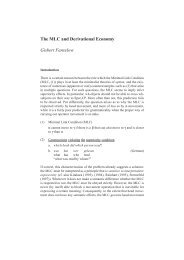Differential subject marking in Polish: The case of Genitive vs ...
Differential subject marking in Polish: The case of Genitive vs ...
Differential subject marking in Polish: The case of Genitive vs ...
Create successful ePaper yourself
Turn your PDF publications into a flip-book with our unique Google optimized e-Paper software.
(grammatical) perfectivity comes <strong>in</strong>to play <strong>in</strong> the present tense. Recall from section 3.1.2 (ex.<br />
(25) and (26)) that <strong>in</strong> the present tense <strong>in</strong>stead <strong>of</strong> the regular negated form <strong>of</strong> the present tense<br />
form <strong>of</strong> byc, the negated form <strong>of</strong> the verb miec ‘to have’ is used (i.e., nie ma ‘not has’ and not the<br />
expected nie jest ‘not is’ form). I would like to suggest that this is so because the present form<br />
jest is not perfective <strong>in</strong> any obvious sense. Recall from section 2 that the actual present ‘jest’-<br />
forms derive from the Old Church Slavonic imperfective subparadigm <strong>of</strong> the present tense<br />
paradigm <strong>of</strong> the verb byti (see Table 1). I would like to suggest that this is precisely why the<br />
defective byc paradigm is supplemented by the verb (nie) ma, which due to its (<strong>in</strong>herent)<br />
transitive nature – just like any other negated transitive verb <strong>in</strong> <strong>Polish</strong> (cf. section 1) – has the<br />
property <strong>of</strong> assign<strong>in</strong>g the GEN <strong>case</strong> under negation. 65 Note that due to its (<strong>in</strong>herent) transitive<br />
nature the GEN-assign<strong>in</strong>g capacity <strong>of</strong> (nie) ma does not depend on its aspectual properties – just<br />
as is the <strong>case</strong> for any other negated transitive verb <strong>in</strong> <strong>Polish</strong> (recall the discussion <strong>in</strong> section 1). In<br />
other words, unlike <strong>in</strong> the <strong>case</strong> <strong>of</strong> negated existential-locative sentences with byc (see below),<br />
there is no requirement for nie ma to be perfective <strong>in</strong> order to assign the GEN <strong>case</strong> to its <strong>in</strong>ternal<br />
argument.<br />
In sum, for a nom<strong>in</strong>al argument <strong>in</strong> existential-locative byc sentences to be marked for<br />
GEN two requirements have to be fulfilled: (i) the right configuration: the nom<strong>in</strong>al argument has<br />
to be generated as a direct <strong>in</strong>ternal argument <strong>of</strong> the negated “quasi-transitive” verb (this<br />
corresponds to the GoN rule <strong>in</strong> <strong>Polish</strong>), and (ii) the right aspectual properties <strong>of</strong> the predicate:<br />
the verb has to be grammatically perfective (this corresponds to the condition for the assignment<br />
<strong>of</strong> the optional Partitive <strong>case</strong> <strong>in</strong> <strong>Polish</strong>; cf. section 1). Given these two conditions responsible for<br />
the GEN <strong>mark<strong>in</strong>g</strong> <strong>in</strong> negated existential-locative sentences, the “hermaphroditic” nature <strong>of</strong> the<br />
GEN <strong>in</strong> such <strong>case</strong>s receives a natural explanation. 66<br />
65 This conclusion corresponds <strong>in</strong> some respect to the conclusion reached by Witkos (2000) <strong>in</strong> his analysis <strong>of</strong><br />
the negative locative copula nie ma. He analyzes nie ma <strong>in</strong> negated existential-locative clauses as “a defective<br />
verb, which can be regarded as an equivalent <strong>of</strong> the transitive verb miec, ‘have’, but tak<strong>in</strong>g a<br />
locative/prepositional argument and devoid <strong>of</strong> the external argument,” and which is composed <strong>of</strong> several<br />
features, among others, the <strong>case</strong> feature [+Objective] (pp. 301-2). Notice that, unlike the analysis proposed <strong>in</strong><br />
this paper, the locative phrase is analyzed by Witkos as an <strong>in</strong>ternal argument <strong>of</strong> the negated copula.<br />
66 It should be po<strong>in</strong>ted out that <strong>in</strong> existential-locative sentences other verbs than byc can be used; cf. (i)<br />
(Grzegorek 1984:108). However, <strong>in</strong> no other <strong>case</strong> is the nom<strong>in</strong>al argument marked for GEN <strong>in</strong> negated<br />
existential-locative sentences; cf. (ii). To expla<strong>in</strong> this, it could be assumed that <strong>in</strong> negated existential-locative<br />
sentences with verbs other than byc the conditions necessary for the GEN <strong>mark<strong>in</strong>g</strong> are not fulfilled: (i) these<br />
verbs are morphologically not perfective and/or the nom<strong>in</strong>al argument is not generated as an <strong>in</strong>ternal<br />
argument <strong>of</strong> a “quasi-transitive” verb (i.e., the locative phrase is not a quasi external argument <strong>in</strong> such <strong>case</strong>s,<br />
but rather an <strong>in</strong>ternal argument, as suggested by Lev<strong>in</strong> and Rappaport Hovav 1995).<br />
(i) a. Na stole lezala ksiazka.<br />
46

















